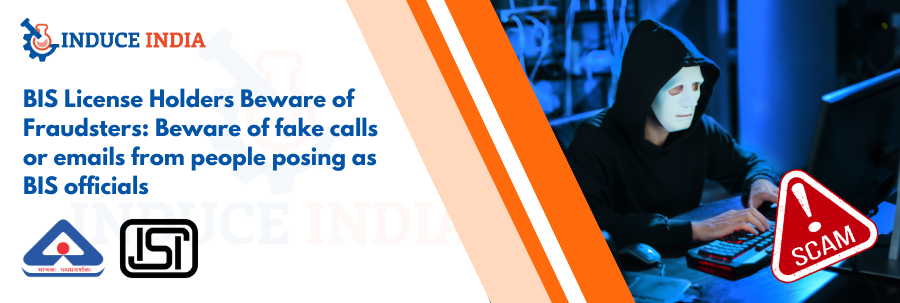If you hold a BIS license, you already understand what that means: a mark of quality, trust, and assurance against national standards. But now, there is some very nasty game going on. Imposters are now targeting holders of the BIS license. They may call you, they may mail you, and they may sound just convincing enough. All this is the trap.
This blog will offer you some clues on how to protect your business from such fraudsters. Let us safeguard that hard-earned license for you.
Why Are Scammers Targeting BIS License Holders?
Fraudsters try to prey on systems that people trust, and BIS is one of them. Possessing a BIS license does immensely empower the business to legitimately conduct their operations, maintain their credibility, and step into larger markets; that’s exactly why it also becomes a target.
These forged documents would warn of danger against loss of the license, creating a sense of urgency, so that the victim might suddenly act before verifying the authenticity of the alert. That is what they bank on.
Fraudsters present themselves as BIS officials and use bureaucratic language, at times even referring to real license numbers or product categories to gain more credibility. Their goal? To persuade you into giving away your money, personal information, or login credentials.
How These Fake Contacts Usually Occur
Let us look into how typical scamming goes on. The first thing it starts with is absolutely a phone call or email. The tone, always polite but urgent, with the person at the other end giving himself a BIS officer title, quoting some regulatory updates concerning your license being under review, or worse yet, under threat of being suspended!
Then you have a payment request issued. This could be called a “verification charge,” “compliance fee,” or “penalty.” The message might contain a link for payment or even banking details, all of which are fake yet appear very official.
Sometimes the email is made to bear a close resemblance to an actual BIS communication, being equipped with a logo, letterhead, and sometimes even a false “reference number.” The intent behind it all is to press you into making rash decisions instantaneously.
Spotting the warning signs
The good thing about hereby is that the scammers have a pretty set pattern behind them. So, if you know what to look for, you can recognize it just in time to distance yourself from the mess.
Urgency is an important red flag. The scammer is going to try to frighten you into acting right now. You are told that your license has expired, that there may be a complaint against you, or that you are being fined.
The other red flag is the demand for payments to be made through unofficial channels like personal bank accounts, mobile wallets, or a link that is not from the official BIS domain. In fact, BIS never solicits payments from personal UPI IDs or third-party services.
Any message from free domains such as Gmail and Yahoo or those with domains slightly off from the official one should be considered suspicious in any case. Always double-check the sender’s address! Small typos are very easy to overlook, but that minute difference may allow great harm.
Lastly, do remember that if the other party refuses to share contact details or official references, or insists that you “don’t talk to anyone else” about their request, it’s a straight giveaway.
Steps to Take When You Are Contacted
First and foremost, don’t panic. That’s exactly what the scammers want.
Whenever you are suspicious about a phone call or email, think twice. Get the person’s name, department they are in, and their official contact number. Tell them that you will verify the request through the designated BIS channels on your own. No legitimate officer of BIS will object to this.
Further, using those contact details from the official BIS website, check with that regional office or ask the question via email to an official ID to determine whether it was an official communication.
Under no circumstances should you ever click on any links or download any attachments from such emails. They might just carry malware or might take you to fake websites that steal your data.
And if asked for payment, never release funds unless you are 100% certain that the payment request is legitimate. BIS never collects payments in any other way except by secure government-authorized payment gateways!
Why Verifying Every Request Matters
Accidentally clicking on the wrong link or sharing login details could be the beginning of big-time trouble. You could lose your money, or worse, your license information could be misused to threaten your firm.
Scammers usually act in bulk. If you have ever been contacted by them, then chances are others are targets as well. Spending a little time to verify the legitimacy of any communication keeps you in control and protects the credibility of your certification.
How BIS Is Fighting Back Against Fake Certification Scams
BIS, being aware of these evolving scams, has started alerting the public on its website and updates it regularly with new fraud warnings and samples of fake emails that are in circulation.
Efforts are also made that shall enhance the security front, among them being improved digital verification systems and awareness campaigns. However, no system can ensure protection against impersonation. Hence, the alertness of the person is as much a barrier as any technical setup.
Keeping Your Team Informed
If you are a team leader, you must share this risk with everyone involved in compliance, licensing, or finance. Sometimes, the scammers will try to target people with lesser authority, who might feel less confident in challenging a request that sounds official.
An extra training session or internal email warning about the signs will do wonders. The more eyes looking out for these frauds, the safer your company will become.
If You Become a Victim
Once you become the victim of a scam situation when all seems lost-quick action is required. Report the incident to BIS through the official communication channels. Inform your bank to either stop or reverse unauthorised transactions. You can approach the local cybercrime cell if you want to file a complaint so that they may track the fraud down while investigating. Though it may take time to get resolutions in some of these cases, each report acts as an aggregated data point from which higher-level agencies may take action.
Final thoughts
These frauds succeed when people act hastily; that’s what the fraudsters count on. But with knowledge of the red flags and the modus operandi of these scams, you will already be a step ahead.
Remember, the BIS never rushes anyone, threatens someone on the phone, or asks for money to be deposited in personal accounts. When in doubt, always check. The BIS license is a mark of trust. Let’s ensure that it cannot be taken away from us through deceit. Stay alert, trust the process, and do not hesitate to make use of official BIS contacts should something not sit right with you. Let us keep Indian businesses strong, certified, and free from scams.



